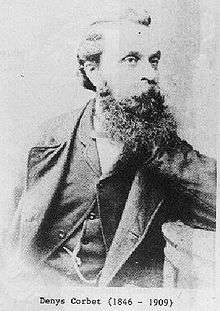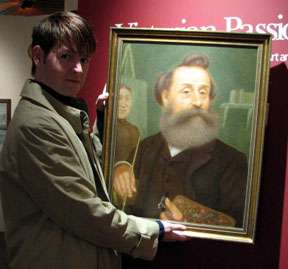Denys Corbet
Denys Corbet (22 May 1826 – 21 April 1909) was a Guernsey poet, naïve painter, and schoolmaster, the second son of Pierre Corbet, a seafarer, and Susanne (née de Beaucamp). He was born at La Turquie, Vale, Guernsey, Channel Islands and is thought to have lost his parents in childhood. He married, probably in 1852, Mary "Elizabeth" Wellington (1833–1909) and had six children.[1] Corbet wrote, for the most part, in the Dgèrnésiais or Guernsey French language.[2][1]

"Last Poet"
Corbet described himself as the Le Draïn Rimeux (The Last Poet). He is best known for his poems, notably the epic L'Touar de Guernesy, a picaresque tour of the parishes of Guernsey, Les Feuilles de la Fôret (The Leaves of the Forest, 1871), and Les Chànts du drain rimeux, ou Pièces de poësie originale en guernesiais et en français (Songs of the Last Rhymer, or Original Pieces of Poetry in Dgèrnésiais and French, 1884).[3] As editor of the French-language newspaper Le Bailliage, he also wrote prose columns in Dgèrnésiais under the pen name Badlagoule (Chatterbox).
The French scholar R. J. Lebarbenchon, in a 1988 tribute, described Corbet as "philanthrope, pacifiste, partisan du progrès, apôtre de l'instruction publique, il se classe aussi parmi les modernes et a foi en l'avenir" (philanthropist, pacifist, supporter of progress, apostle of public education, he ranks also among the moderns and has faith in the future).[1]
Centenary
Today Denys Corbet is largely remembered as a naïve painter of rural life. The Canadian artist Christian Corbet is a collateral descendant. A special exhibition to mark the centenary of Corbet's death was held on 30–31 May 2009 at the Forest Douzaine, Forest, Guernsey, where a portrait of Denys Corbet painted by Christian Corbet was unveiled by Hazel Cotgrove, a great-granddaughter of Denys's.

References
- Cox, Gregory. "Corbet, Denys (1826–1909)". Oxford Dictionary of National Biography (online ed.). Oxford University Press. doi:10.1093/ref:odnb/71080. (Subscription or UK public library membership required.)
- "Denys Corbet, 1826-1909". Archived from the original on 27 October 2009. Retrieved 3 December 2006.CS1 maint: BOT: original-url status unknown (link)
- British Library Main Catalogue Retrieved 7 August 2016.